Unit6 section A 题纲
Unit 6 Section A-九年级单元复习课件(人教版)
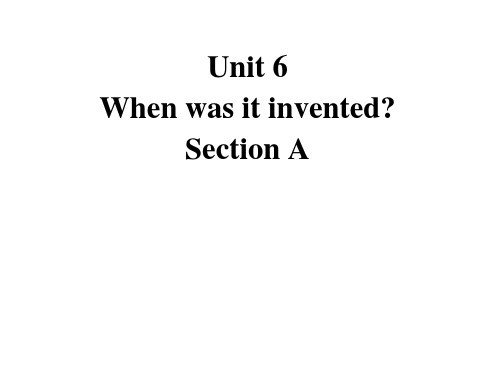
with pleasure与my pleasure 1)with pleasure用于别人求你做某事,你很 乐意去做的时候,意为“我很乐意。”。如:
-Could you mail the letter for me ? -With pleasure. 2)my pleasure完整的说法是It’s my pleasure. 意思是“这是我的荣幸”,通常在 你帮人后人家致谢时才说。如:
Paragraph 2 How tea spread to other countries
Paragraph 3 How tea was invented by accident
Read Paragraph 1 and answer: 1. When was tea first drunk?
About 5,000 years ago.
be made of与be made from
a. The desk is made of wood. b. The shirt is made of cotton. c. The paper is made from wood. d. The wine is made from grapes.
1. be made of:看得出或摸得出原料 2. be made from:看不出或摸不出原料
Read Paragraph 3 and complete the chart.
events
time
was brought to Korea during the 6th and
and Japan
7th centuries
人教版英语八年级上册Unit6 SectionA 教材知识详解
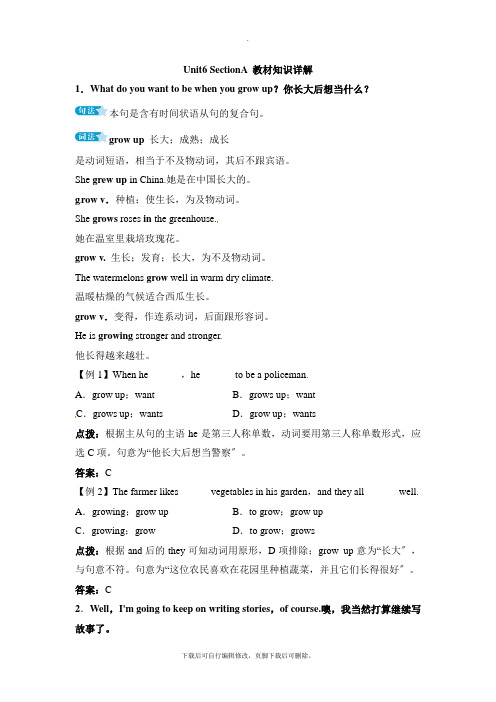
Unit6 SectionA 教材知识详解1.What do you want to be when you grow up?你长大后想当什么?本句是含有时间状语从句的复合句。
grow up 长大;成熟;成长是动词短语,相当于不及物动词,其后不跟宾语。
She grew up in China.她是在中国长大的。
g row v.种植;使生长,为及物动词。
She grows roses in the greenhouse.她在温室里栽培玫瑰花。
grow v. 生长;发育;长大,为不及物动词。
The watermelons grow well in warm dry climate.温暖枯燥的气候适合西瓜生长。
grow v.变得,作连系动词,后面跟形容词。
He is growing stronger and stronger.他长得越来越壮。
【例1】When he ______,he ______ to be a policeman.A.grow up;want B.grows up;wantC.grows up;wants D.grow up;wants点拨:根据主从句的主语he是第三人称单数,动词要用第三人称单数形式,应选C项。
句意为“他长大后想当警察〞。
答案:C【例2】The farmer likes ______vegetables in his garden,and they all ______ well. A.growing;grow up B.to grow;grow upC.growing;grow D.to grow;grows点拨:根据and后的they可知动词用原形,D项排除;grow up意为“长大〞,与句意不符。
句意为“这位农民喜欢在花园里种植蔬菜,并且它们长得很好〞。
答案:C2.Well,I'm going to keep on writing stories,of course.噢,我当然打算继续写故事了。
Unit 6 sectionA 知识点讲解

八年级上册Unit6Section A1.I'm going to study computer science.我打算学习计算机科学。
➢be going to后跟动词原形,表示“(有计划、有目的地)将要/打算做某事”。
其中be动词要随句中主语的人称和数的变化而变化。
be going to结构常和表示将来的时间状语tomorrow,next week,next year或when sb. grow(s) up 等连用。
【例句】I am going to be a pianist when I grow up.长大后我打算当一名钢琴家。
【例句】They are going to take the driving test tomorrow.明天他们将要参加驾照考试。
2. What do you want to be when you grow up?长大后你想当什么?➢grow up为不及物动词短语,意为“长大;成熟;成长”。
其主语可以是人也可以是物。
【例句】When I grow up, I want to be a doctor.当我长大后,我想当一名医生。
【例句】That tree grows up so fast. 那棵树长得这么快。
【例句】The kids grow up so fast. 孩子们成长得如此之快。
3....but I'm not sure about that. ……但是我对此没有把握。
➢be sure about意为“确信;对……有把握”,其后常接名词、代词或动词-ing形式。
其否定形式为be not sure about(不确信;对……没有把握)。
【例句】I am not sure about the result of the interview. 我对这次面试的结果没有把握。
【例句】He is sure about living to ninety. 他自信可以活到九十岁。
人教版八年级上册英语第六单元Unit6《重要知识点》汇总总结
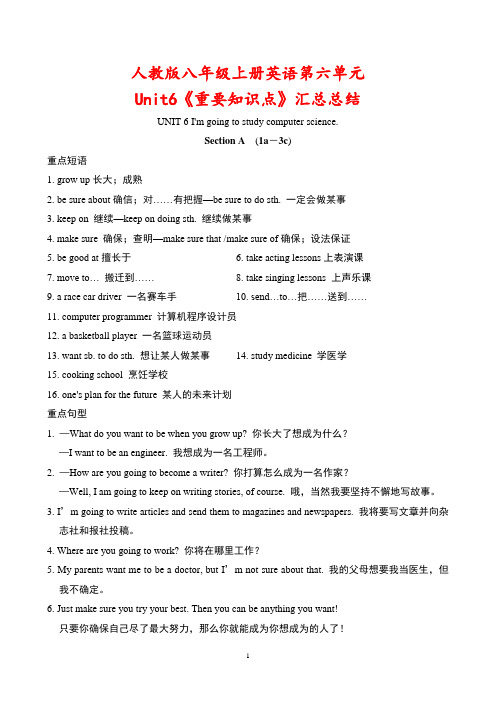
人教版八年级上册英语第六单元Unit6《重要知识点》汇总总结UNIT 6 I'm going to study computer science.Section A(1a-3c)重点短语1. grow up长大;成熟2. be sure about确信;对……有把握—be sure to do sth. 一定会做某事3. keep on 继续—keep on doing sth. 继续做某事4. make sure 确保;查明—make sure that /make sure of确保;设法保证5. be good at擅长于6. take acting lessons上表演课7. move to… 搬迁到…… 8. take singing lessons 上声乐课9. a race car driver 一名赛车手10. send…to…把……送到……11. computer programmer 计算机程序设计员12. a basketball player 一名篮球运动员13. want sb. to do sth. 想让某人做某事14. study medicine 学医学15. cooking school 烹饪学校16. one's plan for the future 某人的未来计划重点句型1. —What do you want to be when you grow up? 你长大了想成为什么?—I want to be an engineer. 我想成为一名工程师。
2. —How are you going to become a writer? 你打算怎么成为一名作家?—Well, I am going to keep on writing stories, of course. 哦,当然我要坚持不懈地写故事。
3. I’m going to write articles and send them to magazines and newspapers. 我将要写文章并向杂志社和报社投稿。
人教版八年级英语上册unit6 sectionA知识点讲解例题
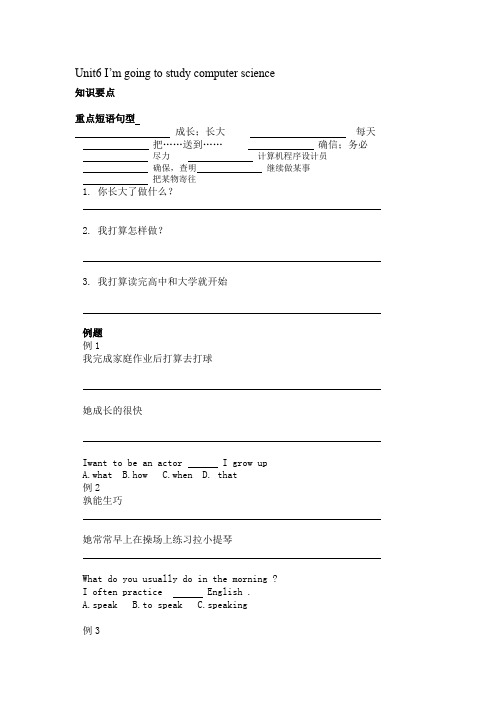
Unit6 I’m going to study computer science知识要点重点短语句型成长;长大每天把……送到……确信;务必尽力计算机程序设计员确保,查明继续做某事把某物寄往1.你长大了做什么?2.我打算怎样做?3.我打算读完高中和大学就开始例题例1我完成家庭作业后打算去打球她成长的很快Iwant to be an actor I grow upA.whatB.howC.whenD. that例2孰能生巧她常常早上在操场上练习拉小提琴What do you usually do in the morning ?I often practice English .A.speakB.to speakC.speaking例3你如果那样做一定会失败的你对自己有把握吗?我们能相信他是正确的吗?她往四下看了看,已确保只有她一人Read your English paper again and there is no mistake in it before you hand it inA.make sureB.turn upe outD.look for例四她脸上漏出了不安的神情什么事情使你担心别替你儿子担心,我们会照顾好他的Tom担心他的语文The boy is lost ,his parents are himA.worryingB.worried aboutC.worry aboutD.worried for例五他试图爬树,可爬不上去她试着做一个飞机模型我可以试穿一下这双鞋吗?The shoes are very nice . I ‘ll take them .You ‘d better first . I’m afaid the size is a bit small for youA. pay for themB. take them offC.put them onD. try them on 例六你可以告诉我们刚才你做了什么I didn’t knowA. when would the train arriveB.where could I get the bookC.what has been doneD. who left the message语法她打算下周日去参观长城看那些云,要你下雨了李磊打算回家明天将有一次班会今天我不准备做家庭作业你要去游泳吗?是的我去下周我将去上海There a basletball game in our school this eveningA. is going to haveB.will haveC.will isD.will beAnn is in hospitalYes , I know . I her tomorrowA.visited to visitC.will visitD.am going to visitYou look excitedI am ! I Jackie Chan’s new movie in DalianA.was going toB.went toC.am going toD.have gone to小试牛刀一. 单项选择(每小题1分,共15分)从A,B,C,D四个选项中,选出可以填入空白处的最佳选项。
Unit 6 Section A Grammar Focus-3c
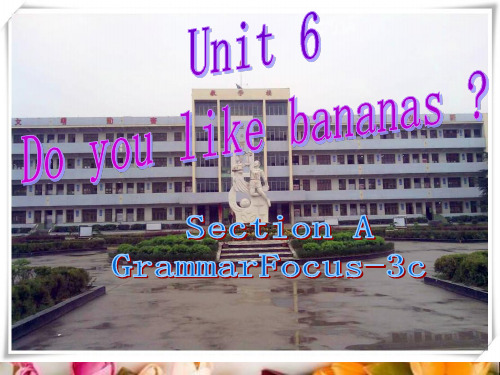
语法释疑
可数名词 (C) 普通名词 人名
名词(nouns)
专有名词 : 地名
不可数名词 (U)
语言、 组织、机构名
物质名词 : 表示物质材料名称的词
e.g. 普通名词:(可数) book, pen, eraser, pear, orange, name, sister, etc. 专有名词:(不可数) Kate, China,English,Macheng,Yantianhe,etc. 物质名词:(不可数) rice, glass(玻璃),oil(油),water(水),etc.
C. Yes, she does. D. No, she don’t.
2.Fill in the blanks with the proper forms of the words in the brackets.(用括号内所给词的适当形式填空)
1. My cousin does every day (每天).
(B)3.She likes milk, her sister milk.
A. but, likes
B. but, doesn’t like
C. and, like
D. so, doesn’t like
(C)4.-Does Gina like strawberries ?
-
.
A. Yes, she like. B. No, she isn’t.
A: Zou Cheng , do you like hamburgers ? B: Yes, I do. What about you , Lei Yan ? A: No, I don’t .
A: Does Zou Cheng like hamburgers ? B: Yes, he does. A: Does Lei Yan like hamburgers? / What (How) about Lei Yan? B: No, she doesn’t.
Unit6 SectionA
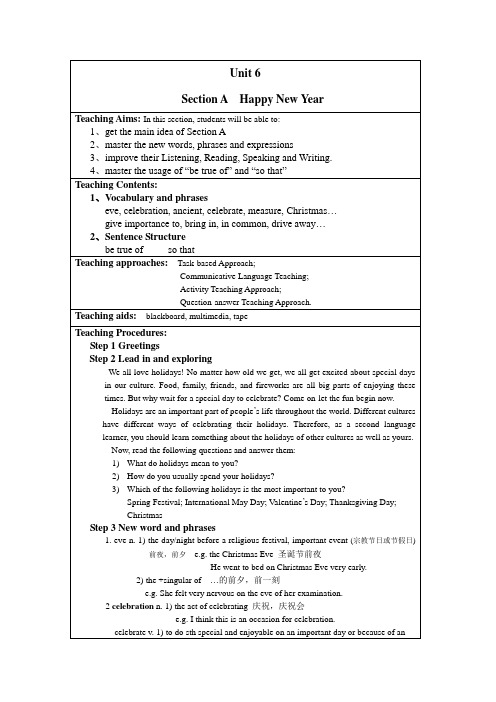
Step 5 Intensive reading
1.New Year’s Eve is the world’s oldest celebration.
Meaning: It is the oldest custom for people all over the world to welcome the coming of the New Year on the night before the New Year’s Day.
e.g. She is an computer expert.
adj. expert (at/in/on sth)有专门的知识/技能
e.g. He is an expert cook.他是一个烹饪老手。
We should get expert advice on this problem.这个问题,我认为要问问专家。
2) secret, not to be shared with other people秘密的;私人的a private letter
3) with no one else present没有其他人在场的;私下;单独
人教版八年级英语上册Unit6 SectionA知识点练习
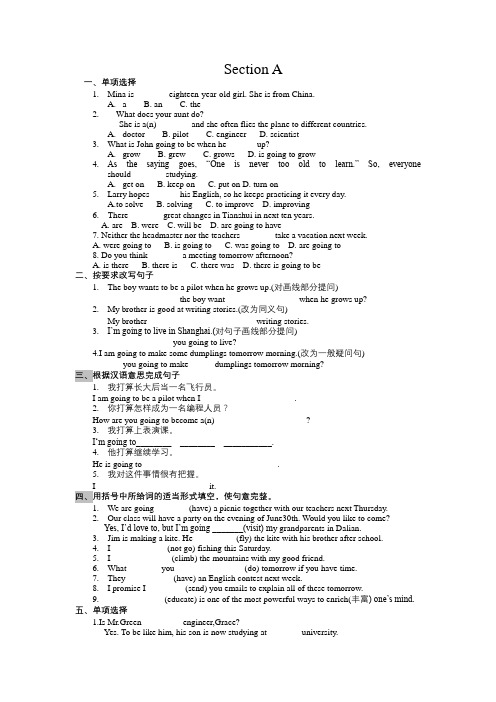
Section A一、单项选择1.Mina is________eighteen-year-old girl. She is from China.A. aB. anC. the2.---What does your aunt do?----She is a(n)________and she often flies the plane to different countries.A.doctorB. pilotC. engineerD. scientist3.What is John going to be when he_______up?A.growB. grewC. growsD. is going to grow4.As the saying goes, “One is never too old to learn.” So, everyoneshould________studying.A.get onB. keep onC. put onD. turn onrry hopes_______his English, so he keeps practicing it every day.A.to solveB. solvingC. to improveD. improving6. There________great changes in Tianshui in next ten years.A. areB. wereC. will beD. are going to have7. Neither the headmaster nor the teachers________take a vacation next week.A. were going toB. is going toC. was going toD. are going to8. Do you think________a meeting tomorrow afternoon?A. is thereB. there isC. there wasD. there is going to be二、按要求改写句子1.The boy wants to be a pilot when he grows up.(对画线部分提问)________ ______ the boy want_______ ________when he grows up?2.My brother is good at writing stories.(改为同义句)My brother________ _____ ________writing stories.3.I’m going to live in Shanghai.(对句子画线部分提问)________ _____you going to live?4.I am going to make some dumplings tomorrow morning.(改为一般疑问句)_______you going to make______dumplings tomorrow morning?三、根据汉语意思完成句子1.我打算长大后当一名飞行员。
人教版英语8年级上册第6单元sectionA知识点总结
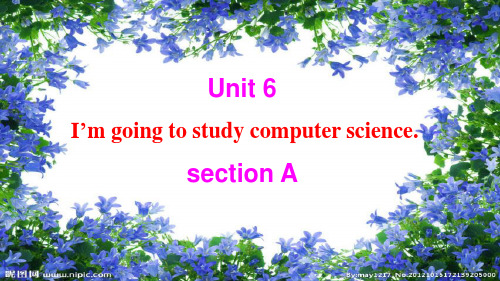
practice doing sth 练习做某事
5. Well, I'm going to keep on writing stories, of course.
嗯,当然我会继续写故事。
keep on doing sth
keep doing sth
坚持做某事 一直做某事
常跟v-ing 作宾语的动词有 consider suggest look forward to practice finish keep/keep on can’t help mind imagine
avoid enjoy miss
6. My parents want me to be a doctor, but I'm not sure about
that.
我父母想让我成为一名医生, 但是我对些还不确定。
be sure about make sure
确信 对……有把握 确保
(2) be sure to do sth 务必;确信 I’m sure to go with you. 我确信和你一起去 be sure +that 从句
We are sure that you can make great progress this term. (3) make sure to do sth 务必干„„
make sure of sb./ sth 弄清楚某人/事 make sure + that 从句
7. take/ have acting/singing/dancing lessons
Unit 6
I’m going to study computer science.
section A
1. be going to 的用法 1). be going to +do 表示将来的打算、计划或安排 2).常与表示将来的tomorrow, next year等时间状语或when 引导的时间状语从句连用. When引导的从句用一般现在时态 。 3).如果表示计划去某地,可直接用be going to+地点
八年级英语Unit6;Topic1预习导纲

八年级英语Unit6;Topic1预习导纲八年级unit6 topic1 预习导纲一词汇1.重点单词section a: field vehicle task airplane airline decide total raise discusssection b: cinema hotel refrigerator fridge standard conditioncomfortable personsection c: common dollar sell noon top forward2.重点词组section a: go on a visit to… make a decisionfind out (留意与find的区分) over/on the phone decide on go on the spring field tripthe best way to dosection b: arrive at/in pay formake a …reservation plan tosection c: word out ask sb. for …come up with at noonput on a show at the weekendthe top of decide to dolook fordward to ( doing ) hear fromsection d: have a rest in the open air see the sunrise have a wonderful time as soon as in the daytime have a big dinner二句子新课标第一网xkb〔一〕重点句子1.i have some exciting news to tell you.2.it will take us a few days to get there by bike.留意句型:it takes/took/will take sb. …to do.3.let’s find out some info rmation about the cost.4.your task is to find out the cost by bus.5.the best way to get there is by ….6.we have tickets at 145 yuan for the hard sleeper. 留意介词at 和for 在此处的用法。
新视野大学英语读写教程第三册Unit_6_Section_A教案讲解

Unit 6 Section A How to Prepare for EarthquakeI. Background information1. The 1906 San Francisco EarthquakeAt 5:13 on the morning of April 18th, 1906, the city of San Francisco was shaken by a terrible earthquake. A large part of the city was destroyed and a large number of buildings were burnt. The number of people who lost homes reached as many as 250, 000. About 700 people died in the earthquake and the fires.Another earthquake shocked San Francisco on October 17th, 1989. It was the second strongest earthquake and about one hundred people were killed. It happened in the evening as people were traveling home. A wide and busy road fell onto the below. A lot of people were killed in their cars, but a few lucky ones were not hurt.Luckily the 1989 earthquake did not happen in the center of town but about 50 kilometers away. In one part of the town many buildings were destroyed. These buildings were over 50 years old, so they were not strong enough. There were a lot of fires all over the city. The electricity was cut off for several days too.Scientists explain that the outside of the earth is made of different plates. At San Francisco the Pacific plate meets the North American plate. When suddenly these two plates jump, an earthquake is felt. When the 1906 earthquake happened, the Pacific plate jumped 5-6 meters to the north.We cannot stop earthquake, but we can do things to make sure they do not destroy a whole city. First, it is not a good idea to build houses along the lines where two of the earth’s plates join together. Second, if you think there may be an earthquake, it is better to build houses on rock not on sand. Third, you must make the houses as strong as possible. Weak buildings will fall down in an earthquake, but strong ones may stay up.Scientists are afraid that one day an even bigger earthquake will hit the area around San Francisco. They call it “The Big One”. However, people today are still building more houses. The population in and around San Francisco is now ten times more than it was in 1906. This means that if there is another big earthquake, a great many houses and buildings will be destroyed.2. The 1976 Tangshan Earthquake1) Which city earns the name “Brave City of China”? Tangshan2) The deadliest earthquake of the 20th century, a magnitude 7.8 earthquake hit the sleeping city of Tangshan at 3:42 a.m. on July 28, 1976.3) Which of the following gave some advance warnings of an impending earthquake?A. Well water rose and fell with cracking or gas.B. Chickens refused to eat and ran around chirping.C. Mice and yellow weasels ran around to hide.D. A goldfish jumped wildly in its bowl.E. Strange lights (fireballs) as well as loud sounds were seen the night preceding the earthquake.4) The Tangshan earthquake lasted approximately 14-16 seconds. After the earthquake hit, 242419 people were dead or dying; 164581 people severely injured. In 7218 households, all members of the family were killed by the earthquake.5) Over two million people died in the earthquake in the 20th century. About 0.6 billion people live in the strong earthquake zone throughout the world. 6) 93 percent of the residential buildings and 78 percent of the industrial buildings were completely destroyed.3. What’s your insight into earthquakes?Because they have no warning and allow people no time to react to them in an effective way. As described in the video, one second you live in this big beautiful city and ten seconds later it is flat. So on any scale of instant destructivity, few natural disasters can come close to earthquakes. At 11:43 A.M. on June 7, 1692, for example, an earthquake struck Port Royal, Jamaica. In the space of less than fifty seconds, that thriving port sank into the Caribbean. An eyewitness described the scene. “In many places the earth cracked, opened and shut, with a motion quick and fast. People were swallowed up; in others they were caught by the middle, and pressed to death.”In the 17th and 18th centuries, it was believed in the Western world that because earthquakes normally occurred in non-Christian countries, they were signs of God’s anger with the inhabitants of these areas. In fact, every day the earth is shaken by hundreds of small earthquakes, most going unnoticed. They usually occur along the boundaries of thin plates that cover the earth like egg shells. Driven by the heat deep within the earth’s core, plates grind against each other along lines called faults. When plates find their motions blocked, stress builds up. Finally the fault gives way. Released energy racesthrough the earth in a form of seismic waves (震波) and a quake occurs.4. How much do you know about other natural disasters?In addition to the earthquake, the human society as a whole is also cursed with a long list of other natural disasters, among which are flood, mud-rock flow (泥石流), landslide (山体滑坡), typhoon, hurricane (飓风), tornado (龙卷风), snowstorm (暴风雪), hailstorm (冰雹), sand storm (沙尘暴), drought (干旱), plague of locusts (蝗灾), the spread of desert, the spread of infectious diseases such as SARS (非典), and volcanic eruptions (火山喷发), the most famous example of which is the Great Pompeii, quickly covered with volcanic ashes.The contributors to these natural disasters are complex and varied. Some disasters such as earthquakes and volcanic eruptions result from the movement of plates along the weaknesses in the Earth’s crust. Many others, like flood, sand storm, and the spread of desert, stem from human activities. Man’s mindless enthusiasm for unrestrained economic growth has led to a sharp decline of forestry, a rapid desertification of farming land, an irreparable depletion of ozone layer, a global worsening of greenhouse effect, and a swift extinction of species, all of which in turn bring about more disasters.II. Structure Analysis1. How can we know about warning signs of earthquakes?1) Wire the earth and sea …2) Watch animals and plants …3) The amount of radon waxes …2. What animals show what signs of earthquakes?1) hens—cages 2) snakes—freeze 3) dogs—bark a lot 4) fish—surface5) birds—noisy—fly unusuallySome advance warnings of an impending earthquake.A. Well water rose and fell with cracking or gas.B. Chickens refused to eat and ran around chirping (吱喳而鸣).C. Mice and yellow weasels (黄鼠狼) ran around to hide.D. A goldfish jumped wildly in its bowl.E. Strange lights (fireballs) as well as loud sounds were seen the night preceding the earthquake.3. How are most of the people killed in an earthquake?By falling buildings.4. What building structures might prevent the great destruction of property?1) Steel joint/an I-joint2) Equally strong columns & horizontal beams3) Deep vertical support columns4) Light roofs & strong walls5. What should people do to prepare their houses?1) Check/reinforce homes …2) Place heavy objects …3) Attach cupboards & cabinets …4) Fasten doors …6. What should people need for their earthquake survival supplies, and why?water & food radio receiver torch extra batteries first-aid supplies spade tent rope clothing fire extinguisher auxiliary cooking & heating source heavy shoes or boots7. How can family members keep in touch during an earthquake? Check in with a far-away friend or relative…8. What should be a major emphasis for all government programs and earthquake-related research projects?Education concerning how to survive an earthquake.1.What is the text mainly about?The essay is centered around the main theme — How to predict, prevent, and prepare for earthquakes.2.How is the text organized?The writer centers his writing on three aspects of the topic—earthquake prediction, earthquake prevention, and earthquake preparation. In the end, he concludes his writing with more emphasis placed on people’s preparation for earthquakes. So the text can fall structurally into four parts.Part I Prediction: People predicted a quake by wiring the earth and sea to detect movements, watch-ing animals and plants for warning signs; and seeing if the amount of radon (Rn) in the water under the surface of the Earth waxes before an earthquake.Devices for developing it: Exemplification: (Para. 1) In Japan, scientists have wired the Earth and sea…The Chinese have traditionally watchedanimals and plants for…For example, …Before the Hansin earthquake in Japan, …Part II Prevention:To prevent buildings from threatening our lives, new structures need to be built with an I-joint steel, with columns and horizontal beams of equal strength, and with light roofs; and pillars for highway bridges need to be enclosed in steel.Devices for developing it: Deduction: (Para. 2) General Statement: People would also like to…prevent…Details: 1) Most people are killed by…2)…with steel joint; 3)…of equal strength 4)…enclosed in steel. Part III Preparation: To prepare for a great quake, you need to keep survival supplies at home and at work; have proper tools ready at hand; make sure what to do in case of a quake; and plan for family re-unity.Devices for developing it: Deduction: (Paras. 4-6) General statement: People …need to prepare themselves. Details: 1) …have supplies of water and food…; 2) Have a fire extinguisher handy; 3) Every family needs to have earthquake emergency plans.Part IV Conclusion: Even if prediction becomes possible, people still have to do their best to prevent disasters by improving building structures and by being personally prepared.Devices for developing it: Induction: (Para. 7) Known facts: 1) …scientists learn much about how quakes work; 2) It will be possible to predict quakes with accuracy; 3) But people still have to prevent quakes. Conclusion: Education concerning …should be a major emphasis for all …projects.III. New words and expressions1. to watch sth. for…/ to watch for 观察某物以获取······/ 小心等待He has been watching for the right moment to express his feeling of love for her.2. to come out of 爬出······/ 有······结果Good reward will certainly come out of your good intention.3. to be reported to do sth. in unusual patterns 据报道说以异常的方式做某事They are reported to be celebrating their victory in unusual patterns.4. to withstand the power of earthquakes 抵御地震的力量Any friendship that can’t withstand the trial of hardships is not likely to last long.5. to be a major concern 是关注的重点How to prevent the resurgence (卷土重来) of SARS is one of the major concerns among the public.6. to insert sth. in / into / between 把某物插入······中/中间The Maxwell House inserted in a newspaper an advertisement : Good to the last drop. 麦氏公司(Maxwell House)在一家报纸上曾刊登了一则广告:滴滴香浓,意犹未尽。
Unit6SectionA3a-3c

通过阅读文章,懂得分享阅读快乐。
(2014广东) 阅读理解 A篇
阅读指导: 1.迅速浏览大标题,知道每个方框的大致内 容; 2. 先看问题,圈出问题的关键词,再看答案 在哪个方框或哪个位置,回原文找答案。 3.注意文章的首段,尾段;每段话的首句, 末句 ,有利于理解每段的段落大意。
5. Tea is now _t_r_a_d_e_dbetween many different countries.
Summary :
1. Words: ruler, boil, remain, national, trade, doubt...
2. Phrases: by accident, by mistake, take place, fall into, without doubt, not…until
Let’s enjoy a video.
Answer the questions according to the video.
1. What is the video about? It’s about the tea culture in China.
2. Who is the writer of Cha Jing? Lu Yu.
1. Words: ruler, boil, remain, national, trade, doubt...
2. Phrases: by accident, by mistake, take place, fall into, without doubt, not…until
- 1、下载文档前请自行甄别文档内容的完整性,平台不提供额外的编辑、内容补充、找答案等附加服务。
- 2、"仅部分预览"的文档,不可在线预览部分如存在完整性等问题,可反馈申请退款(可完整预览的文档不适用该条件!)。
- 3、如文档侵犯您的权益,请联系客服反馈,我们会尽快为您处理(人工客服工作时间:9:00-18:30)。
Unit6 section A 题纲多久一次how often 在周末on weekends在度假on vacation 去看电影go to the movies看电视watch TV 去购物go shopping(swimming/ camping/fishing/climbing) 帮助做家务help with housework 帮助某人做某事help sb do sth=help sb to do sth 上网use the Internet 读英语书read English books 每天every day一周一次once a week 一周两次twice a week一月三次three times a month 有空的be free下周next week 上钢琴舞蹈课have dance and piano lessons哪种舞蹈what kind of dance 摇摆舞swing dance不得不做某事have to do sth 踢足球play soccer喝牛奶drink milk 熬夜stay up late吃健康的早餐eat a healthy breakfast 吃苹果eat apples做运动play sports 至少at least早点睡觉go to bed early 放学后after school1.周末你通常干什么?我总是锻炼。
What do you usually do on weekends? I always exercise.2.他们周末干什么?他们经常帮助做家务What do they do on weekends? They often help with housework.3.你弟弟周末干什么?他有时候去购物。
What does your brother do on weekends? He sometimes goes shopping.4.你多久锻炼一次?一月一次。
How often do you exercise? I exercise once a month.5.你多久去看一次电影?一周四次。
How often do you go to the movies? Four times a week.6.TON多久看一次电视?他几乎从不看电视。
How often does Ton watch TV? He hardly ever watches TV7.你多久读一次英语书?我一周大约读两次。
How often do you read English books?8.你哥哥多久上一次钢琴课?How often does your brother have piano lessons?你父母多久锻炼一次?一年十次。
How often do your parents exercise? They exercise ten times a year.9. 周末你妈妈去购物吗?不,她从不去购物。
Does your mother go shopping on weekends? No, she never goes shopping.10.你正在学哪种舞蹈?What kind of dance are you learning?11.我得和我的朋友们一起打网球。
I have to play tennis with my friends.12.你最喜欢的电视节目是什么?What is your favorite program?section B 题纲想要做某事want to do sth 想要某人做某事want sb to do sth对…有好处be good for…对…有害处be bad for…擅长做某事be good at doing有良好的生活习惯have good habits多少小时how many hours 每晚every night喝牛奶drink milk 喝咖啡drink coffee吃蔬菜eat vegetables 吃水果eat fruit询问某人关于某事ask sb about sth 让某事做某事ask sb to do sth吃惊be surprised = get a surprise 至少at least一周三四次three or four times a week百分之二十twenty percent一周一至三次one to three times a week一点也不not …at all玩电脑游戏play computer games 去野营go camping上网use the Internet=go online 开始做某事start doing =start to do 画画draw pictures 看电视超过两个小时watch TVfor over 2 hours 喝果汁drink juice 帮助某人做某事help sb with sth(共3种)去看牙医go to the dentist许多好习惯a lot of good habits多于两小时more than two hours 少于两小时less than two hours熬夜stay up late一个16岁的中学生a 16-year-old high school students 1.你多久喝一次牛奶?我每天喝牛奶。
How often do you drink milk? I drink milk every day.2.我妈妈想要让我每天喝牛奶。
My mother wants me to drink milk every day.3.她说喝牛奶对我的健康有好处。
She says drinking milk is good for my health.4.你每晚睡多少小时?How many hours do you sleep every night?5.多吃蔬菜对你的身体有好处。
Eating lots of vegetables is good for your health.6.通过上网来放松是不错的。
It is good to relax by using the Internet.7.最好的放松方式是通过锻炼。
The best way to relax is through exercise.她从不去牙医那里洗牙She never goes to the dentist for teeth cleaning.初二英语unit7 section A 题纲打鼓play the drums 两个都both…and…高得多much taller鼓打得好play the drums well 跑得快run fast 更矮一点 a little shorter 跳得高jump high 工作努力work hard起得早get up early 歌唱比赛singing competition和…一样…as…as……不如…not as…as…和…一样the same as 和…不一样be different from唱歌好sing well 学习一些新的东西learn something new 想要做某事(3)want to do= feel like doing= would like to do最重要的事情the most important thing跳舞好dance well玩的开心(3)have fun = have a good/wonderful time做某事玩的开心have fun doing 努力的学习英语study English hard1.我比我妹妹更开朗。
I am more outgoing than my sister.2.我妹妹比我聪明。
My sister is smarter than me.3.他唱歌比sam声音响亮。
He sings more loudly than sam.4.Tara比Tina 更幽默吗?不,不是。
Is Tara funnier than Tina? No, she isn’t.5. tom 和mary两个都会打鼓。
Both tom and mary can play the drums.6.我弟弟和我一样工作努力。
My brother works as hard as me.Mary不如她弟弟那样擅长体育运动。
Mary isn’t as good at sports as her brother.7.你和你妹妹一样友好吗?Are you as friendly as your sister?8.你爸爸和你跑的一样快吗?Does your father run as fast as you?9.你爸爸和你妈妈谁更聪明?我认为我爸爸比我妈妈聪明。
Who is smarter, your father or your mother? I think ……初二英语section b 题纲使某人做某事make sb do sth 关心,在意care about擅长做某事be good at doing 和…一样the same as努力学习study hard 努力工作work hard她最好的朋友her best friend 大多数孩子most kids喜欢做某事enjoy doing=like doing/todo 交朋友make friends 只要as long as 和…不同be different from使显现bring out 取得好的成绩get good grades事实上in fact 谈论某事talk about sth和…相似be similar to 和某人相处得好be good with sb 打电话给某人call sb at+号码有趣的多much more interesting1.我认为一个好朋友会使我笑。
I think a good friend makes me laugh.2.我最好的朋友喜欢做和我一样的事情。
My best friend likes to do the same things as me.3.对我而言,学习英语很有必要。
It’s important for me to study English.4.他比他最好的朋友学习更努力。
He studies harder than his best friend.5.我们都很安静。
We are both quiet.6.我们都喜欢运动。
We both like sports.7.我妈妈告诉我一个好朋友像一面镜子。
My mother told me a good friend is like a mirror.8.我妹妹不如大多数孩子稳重。
